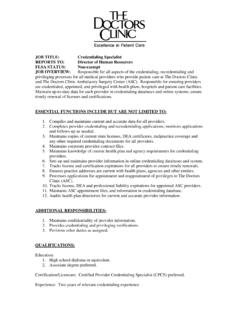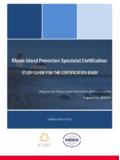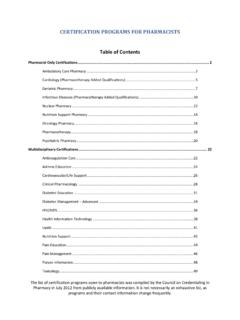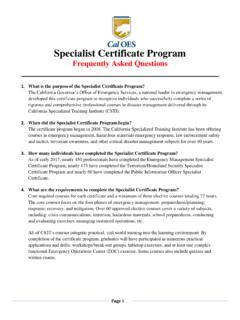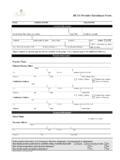Transcription of Certified Recovery Support Specialist (CRSS)
1 Certified Recovery Support Specialist (CRSS) Frequently Asked Questions (FAQs) 2/6/2017 (1) What is the Certified Recovery Support Specialist (CRSS) credential? The CRSS is a credential for people who provide professional peer services for persons in Recovery from mental illness or combined mental illness and substance use disorders. The CRSS professional is trained to incorporate his or her own unique personal life experiences as a current or former recipient of mental health or MISA services, in providing peer-to-peer mental health, rehabilitation, and substance abuse services. The CRSS credentialed professional must have the knowledge and skill that meet minimum acceptable standards of the Recovery Support profession, regardless of having an academic degree. (2) How does a person obtain the Certified Recovery Support Specialist (CRSS) credential?
2 Candidates must complete and submit an application for CRSS to the Illinois Certification Board (doing business as IAODAPCA ). The document entitled Illinois Model for Mental Health Certified Recovery Support Specialist outlines the requirements for the credential, and includes an application. This document is available for download at . Click on Credentialing, then Credentialing Forms. (3) What are the requirements for the Certified Recovery Support Specialist (CRSS) credential? The requirements are outlined in Illinois Model for Mental Health Certified Recovery Support Specialist and include a minimum of: High school diploma or GED 2,000 hours supervised work experience, which can include any combination of paid or volunteer work 100 hours supervision in the CRSS performance domains (see #4 below) 100 hours training and education related to CRSS domains, professional ethics and responsibility, and other core functions Successful completion of a written exam for CRSS.
3 (4) What are the CRSS domains or core functions? The four CRSS domains are: Advocacy Mentoring Recovery Support Professional responsibility Certified Recovery Support Specialist (CRSS) Frequently Asked Questions (FAQs) 2/6/2017 (5) What is the difference between CRSS I and CRSS II? CRSS I and CRSS II are categories of continuing education. They do not refer to different credentials or different levels of a credential. Category I CEU s (CRSS I) include education specific to knowledge and skills that are directly related to the core domains outlined above, which also directly relate to mental health Recovery and the role of peer Support in the Recovery process. Category II CEU s (CRSS II) include education related to the core domains, but they do not have to be specific to mental health Recovery and peer Support . (6) What is the difference between the PRCP and the CRSS?
4 In order to obtain the CRSS, a candidate must be a person who is or was formerly a recipient of mental health or MISA services. For a PRCP (Psychiatric Rehabilitation Certificate Program) certificate, any interested individual may complete the coursework and obtain the certificate; lived experience is not required. Additionally, the PRCP is a curriculum-based certificate program. There is no additional experience requirement beyond the completion of the coursework. Whereas the CRSS is a competency-based credential. In order to achieve this type of credential, a combination of training, work experience, and satisfactory completion of an exam are required, and the credential must be maintained over time through completion of continuing education requirements. (7) What does it cost to obtain the Certified Recovery Support Specialist (CRSS) credential?
5 The application fee is $ The examination fee is $125. The annual renewal fee is $ (8) How do these costs compare to other states credentials? Illinois is the lowest of most states in all certification/credentialing fees. As a point of reference: Illinois charge $ annually. Wisconsin charges $ annually. New York charges $ per year and up. (9) Why don t we have licensure for CRSS instead of this type of credential? Higher levels of education (Bachelors and Masters) are required for IDPR (Illinois Department of Professional Regulation) licensure as compared to the High School Diploma/GED required for ICB certification. Certified Recovery Support Specialist (CRSS) Frequently Asked Questions (FAQs) 2/6/2017 (10) How is CRSS defined in Rule 132? Certified Recovery Support Specialist or CRSS An individual who is Certified and in good standing as a Recovery Support Specialist by the Illinois Alcohol and Other Drug Abuse Professional Certification Association, Inc.
6 (IAODAPCA). (11) How does the CRSS credential affect a person s billing title in Rule 132? According to Rule 132, a person with the CRSS credential is qualified as a Mental Health Professional or MHP. The definition of an MHP in Rule 132 is: An individual who provides services under the supervision of a qualified mental health professional and who possesses: a bachelor's degree; a practical nurse license under the Nurse Practice Act [225 ILCS 65]; a certificate of psychiatric rehabilitation from a DHS-approved program plus a high school diploma plus 2 years experience in providing mental health services; a Recovery Support Specialist Certified and in good standing with the Illinois Alcohol and Other Drug Abuse Professional Certification Association, Inc., an occupational therapy assistant licensed under the Illinois Occupational Therapy Practice Act [225 ILCS 75] with at least one year of experience in a mental health setting; or a minimum of 5 years supervised experience in mental health or human services.
7 A supervised internship in a mental health setting counts toward the experience in providing mental health services. Any individual meeting the minimum credentials for an LPHA or QMHP under this Part is deemed to also meet the credentialing requirements of an MHP. (12) What should a person do to get started if they want to get their CRSS? Read the document entitled Illinois Model for Mental Health Certified Recovery Support Specialist , which outlines the requirements for the credential, and download the application. These documents are available for download at . Additionally, you can contact the DMH Region Recovery Support Specialist in your area for additional information, Support and guidance in walking through the process.





